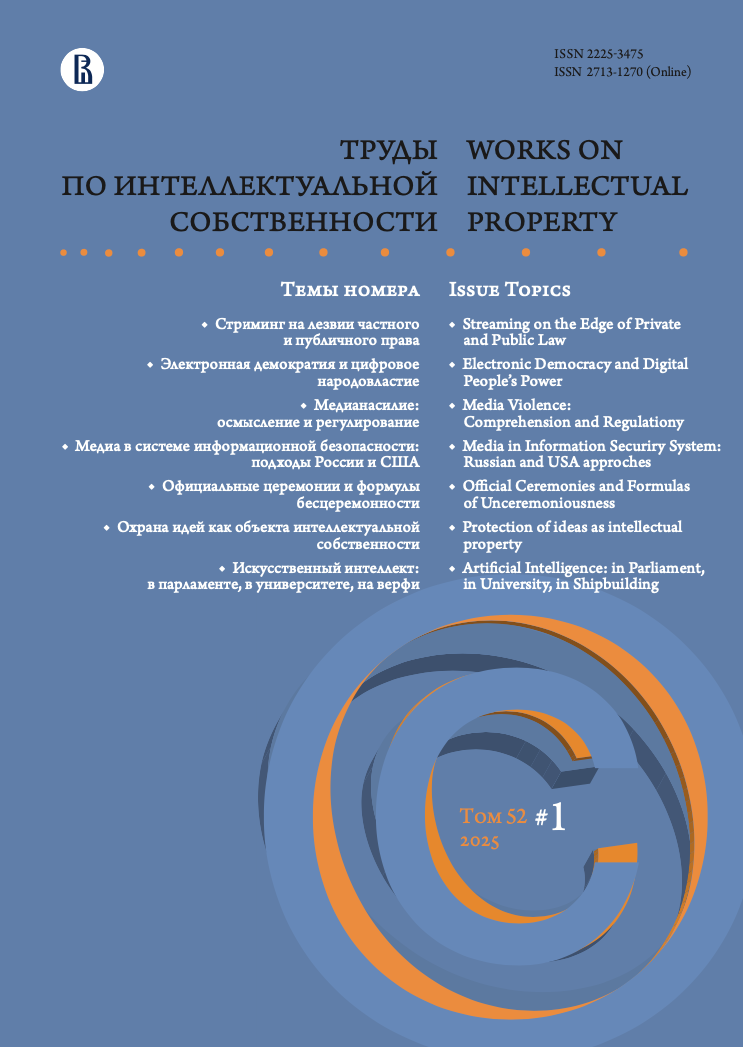USE OF NEW TECHNOLOGIES FOR COPYRIGHT PROTECTION ON E-COMMERCE PLATFORMS: INTERNATIONAL EXPERIENCE
Abstract
This article examines the specificities of copyright protection on e-commerce platforms in various jurisdictions, with a particular focus on the United States, the European Union and China. E-commerce platforms are often used as channels for the distribution of digital content, including text, images, videos and music, which can lead to copyright infringement. In response to these challenges, the article analyzes strategies for copyright protection on e-commerce platforms, including implementing robust copyright policies, using technological tools such as digital rights management (DRM) and watermarking, conducting regular monitoring for copyright infringement, and taking proactive measures against infringers. Finally, the important role of copyright protection in shaping the evolution of e-commerce and the digital economy is emphasized. By balancing copyright protection with freedom of expression and innovation, companies can create a sustainable ecosystem that fosters creativity, protects intellectual property and benefits consumers worldwide.
Downloads
References
Digital Millennium Copyright Act, 1998. (DMCA), 17 U.S.C. § 512(c).
Рузакова О.А., Гринь Е.С. Вопросы защиты интеллектуальной собственности в области технологий виртуальной и дополненной реальности (VR, AR) // Вестник Пермского университета. Юридические науки. 2020. № 49. C. 502–523.
Шугуров М.В. Парадигма модернизации авторского права Европейского союза в контексте цифровой экономики // Международное право. 2019. № 4. C. 1–26.
Stokes S. Digital copyright: law and practice. Bloomsbury publishing, 2019.
Menell P.S. Envisioning Copyright Law's Digital Future // NYL Sch. L. Rev. 2002. Vol. 46. P. 63.
Zenkina E. V. About current trends in global e-commerce // Beneficium. 2022. Vol. 1 (42). P. 68-73.
Chaffey D. E-business and E-commerce Management: Strategy, Implementation and Practice. Pearson Education, 2007.
Directive 2000/31/EC of the European Parliament and of the Council of 8 June 2000 on certain legal aspects of information society services, in particular electronic commerce, in the Internal Market (“Directive on electronic commerce”).
Directive 2001/29/EC of the European Parliament and of the Council of 22 May 2001 on the harmonisation of certain aspects of copyright and related rights in the information society.
Pokrovskaya A. Intermediaries liability for copyright infringement: application of the “safe harbor” model // E3S Web of Conferences. 2023. Vol. 420. P. 06046.
Directive (EU) 2019/790 of the European Parliament and of the Council of 17 April 2019 on copyright and related rights in the Digital Single Market and amending Directives 96/9/EC and 2001/29/EC.
Официальный сайт, онлайн ресурс: Copyright Reform: Questions and Answers. — URL: https://digital-strategy.ec.europa.eu/en/faqs/copyright-reform-questions-and-answers
Directive 2002/58/EC of the European Parliament and of the Council of 12 July 2002 concerning the processing of personal data and the protection of privacy in the electronic communications sector (Directive on privacy and electronic communications).
Regulation (EU) 2016/679 of the European Parliament and of the Council of 27 April 2016 on the protection of natural persons with regard to the processing of personal data and on the free movement of such data, and repealing Directive 95/46/EC (General Data Protection Regulation).
Shapiro T., Hansson S. The DSM Copyright Directive: EU Copyright Will Indeed Never Be the Same // European Intellectual Property Review. 2019. Vol. 41 (7). P. 404–414.
Chodak G. The Future of E-commerce. Springer Books, 2024.
Safieddine F. M-commercem // Innovations in E-systems for business and commerce. 2017. P. 227–243.
Albshaier L., Almarri S., Hafizur Rahman M.M. A Review of Blockchain’s Role in E-Commerce Transactions: Open Challenges, and Future Research Directions // Computers. 2024. Vol. 13(1). P. 27.
Anderson J., Johnson D. The Role of Artificial Intelligence in Enhancing E-Commerce Customer Experience // EasyChair. 2024. No 13355.
Xu Chunshan v Tian Qinghong, Liu Yanbo and Shandong Shibo, 2019. — URL: https://www.lexology.com/library/detail.aspx?g=a6a9ba62-7f0d-4982-b60a-c0c816d42297
Bayer v Li Qing, 2017. — URL : https://www.lexology.com/library/detail.aspx?g=a6a9ba62-7f0d-4982-b60a-c0c816d42297
Copyright (c) 2025 Works on Intellectual Property

This work is licensed under a Creative Commons Attribution-NonCommercial-NoDerivatives 4.0 International License.


